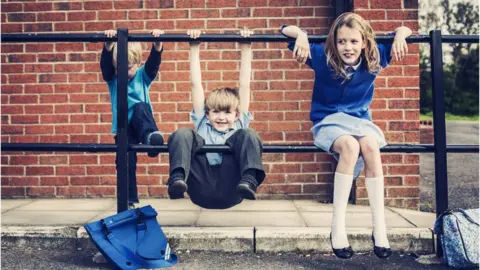Covid: 'Children put at risk by health inequalities'
 Getty Images
Getty ImagesThe coronavirus pandemic risks damaging the health and wellbeing of a generation of children and young people in England unless urgent action is taken, according to a major report.
It found the poorest families had been hit hardest, leaving children hungrier and unhappier than they were before.
The pandemic had also affected "every stage of the life course", it said.
The Build Back Fairer report calls for health and social inequalities to be reduced through investment.
Report author Prof Sir Michael Marmot's analysis concludes that England was already in a poor state of health before the pandemic began, as highlighted in a previous report - and that made Covid's impact even worse.
Deprivation pattern
A "lost decade" between 2010 and 2020 in which improvements in life expectancy were stalling and the numbers of people in poor health were rising, was one reason why England had the worst excess death rate linked to Covid of any country in Europe, he says.
Levels of deprivation within an area have an enormous impact on mortality rates from Covid-19, the report shows.
At the root of this are increasing inequalities, which meant that ethnic minority groups, deprived communities and key workers were more at risk of dying from Covid than other people.
Prof Marmot, professor of epidemiology at University College London and director of the UCL Institute of Health Equity, said it was particularly striking that the high death rates among black, Asian and other ethnicities were linked to overcrowded living conditions, poor quality housing and working in high-risk jobs.
Where people lived also had a bearing, with the most deprived local authorities having the highest death rates from Covid-19, resulting in the north of England being worst hit overall.
In turn, children and young people's lives have also been affected by the pandemic.
Widening education gap
Children at schools in the poorest areas have lost more than six months of learning during the pandemic compared to only a few weeks in schools in the least deprived areas, widening the educational gap between rich and poor.
The report found rises in domestic violence and food insecurity as well as poorer mental and physical health, brought on by lockdown restrictions and damaged job prospects.
 Getty Images
Getty ImagesYoung people, particularly, are reporting more feelings of psychological distress and depression than normal.
Prof Marmot said it would be mistake to go back to the way things were before the pandemic because that was "marked by stagnation of health improvement and widening health inequalities".
Instead, he said, there was an "urgent need" to do things differently - "to build a society that functions to meet the needs of its members; to build a well-being economy that puts achievement of health and well-being at the heart of government strategy, rather than narrow economic goals..."
The report's long-term recommendations include:
- improving prevention and treatment of mental health problems among young people
- reducing child poverty
- prioritising reduction of inequalities in children's early years development
- creating a public health system which prioritises deteriorating living and working conditions to improve health
'Wrong direction'
Prof Marmot said having a huge national debt was "not an excuse" for the UK to do nothing about the issues highlighted, and it would take some time to recover from the pandemic.
Health and wellbeing had to be a priority, he said, and equality should be at the centre of government policy to ensure fairness for all.
But at present, he said, England was "going in the wrong direction".
Dr Jennifer Dixon, chief executive of the Health Foundation, which commissioned the report, said mitigating the damage caused by the pandemic must be at the heart of the government's plans for recovery and levelling up.
"For young people, this means practical help to find employment and training to access better-quality jobs," she said.
"As we rebuild, these measures are vital to ensure that the generation of young people who have lived through the pandemic don't continue to feel its impact on their health throughout the rest of their lives."
